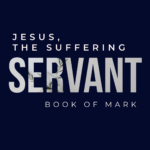

Lord of the Sabbath : Part 2
His Argument from Human Predicament
The second incident recorded in our text occurs on another Sabbath day, here at the beginning of chapter three. Jesus is teaching in the synagogue. Nothing new with that, it was something He did regularly.
In the congregation that day was a man with a withered or shrunken hand. The same word is used to describe the fig tree that Jesus cursed in Matthew chapter twenty-one. So, his hand was useless. Luke records that it was the man’s right hand. For most people, the right hand is the predominant one, the one that enables them to work and earn a living. Marvin Vincent writes: “The [Greek] participle indicates that the withering was not congenital, but the result of accident or disease.” So, this man was not born with a deformity.
Now, notice verse two. The scribes and the Pharisees were watching Jesus to see whether or not He would heal someone on the Sabbath day. They are watching Him, not just out of curiosity or interest, now there’s animosity. They are watching to see what he will do so they can accuse Him of breaking the Law. That would tarnish His reputation in the eyes of the people and give them an excuse to bring Him before the Sanhedrin. But because of His deity, Jesus always had the upper hand. All along He knew what they were thinking!
Again, Jesus seems to intentionally raise the tension level in the situation. He commands the man with the withered hand to stand up and move into the middle of the room! Now Jesus has everyone’s attention. As everyone is looking at Him, He asks the question; “Is it lawful to do good on the sabbath days or to do evil; to save life, or to kill?” In my mind, this is a rhetorical question; the answer is self-evident. I’m fairly certain Jesus intended it to be so.
After asking the question, Jesus paused to give them time to reflect on His question. As they’re thinking about what He said, He takes time to look over the entire audience slowly and deliberately. Mark says He looked around about Him with anger because he was grieved at the hardness of their hearts. The original grammar of the sentence tells us that His anger was momentary and fleeting, but the grief was continuing.
The heart and attitude of these religious men were in a state of moral ossification like hardened hands or feet. Poros was used to describe a particular kind of stone, marble, and also of the callus on fractured bones. The Pharisees were hardened against this new truth by their previous conceptions of how it should be applied.
Then He says to the man, “Stretch out your hand.” The man obeyed and immediately his hand was restored to wholeness like his uninjured one.
How would you have responded if you’d been there? Would you have been glad for the man who was healed? For myself, I would quickly say, “Yes, I would be glad for him.” But what if that healing made me look foolish in the eyes of my peers? After all, what if the roles had been reversed? What if I were the one with the withered hand?
Think of what this meant to him, not only physically, but also spiritually and emotionally! If he were a day laborer, he would be much more likely to be hired now because he was a whole man. He could once again provide for himself and his family if he had one. He would no longer replay over and over in his mind the circumstances that led to his disability. Instead, he would relive the miraculous moment when his hand was restored and along with it his life was restored! He could now hold his head high and walk with confidence.
Oh, but notice the response of the Pharisees. Our text says, “The Pharisees went forth and immediately took counsel with the Herodians against Him, how they might destroy Him.”
Who were the Herodians? They were a political party that wanted to restore Herod to the throne of Judea. They opposed the Pharisees because they wanted a descendant of David on that same throne. So, they were political enemies. Yet because of their hatred for Jesus, they worked together to destroy Him. “The enemy of my enemy is my friend.”
This incident reminds me of one that’s recorded in Luke’s Gospel. It’s in chapter 13, verses 14 to 17 where Jesus healed a woman on the Sabbath. “And the ruler of the synagogue answered with indignation, because Jesus had healed on the Sabbath day, and said unto the people, There are six days in which men ought to work: in them therefore come and be healed, and not on the Sabbath day.
The Lord then answered him, and said, You hypocrite, do not each one of you on the Sabbath loose his ox or his ass from the stall, and lead him away to watering? And ought not this woman, being a daughter of Abraham, whom Satan has bound, lo, these eighteen years, be loosed from this bond on the Sabbath day? And when he had said these things, all his adversaries were ashamed: and all the people rejoiced for all the glorious things that were done by him.”
There is a time and place for anger, for righteous indignation. When we see the helpless and innocent being exploited by the powerful, we should be angry. When we see children abused and abandoned by those who brought them into this world we should be upset enough to act.
But that wasn’t the kind of anger the Pharisees had. No, they had a blind and senseless rage; a violent reaction to someone who made them look bad in the presence of their peers. It was pure hatred for a truly holy person! I’ve never seen that kind of rage that will lead to murder like theirs eventually did. But I have seen the rage of people when their hypocrisy has been exposed; it leads them to bitterness and character assassination.
Their hatred was so sad because, in their desire to obey God’s law and keep the Sabbath, they had come to the place where they missed the basic reason why God created the Sabbath.
God didn’t create the Sabbath because He was tired and needed a rest. No; He created the Sabbath for the benefit of His creation. It is interesting to note that man was created just as (what we might call) God’s ‘weekend’ was beginning. Had God’s plan proceeded as it should have, the whole of human history would have been spent in the joyous ‘Sabbath rest for the people of God’ Hebrews 4:9. But sin entered the picture, and our days are now spent in wearisome toil.
After the sin of our first parents, the seventh day, or the Sabbath is not mentioned again until the celebration of the Passover in Exodus. When the children of Israel were in the wilderness, before receiving the Law at Mt. Sinai, they were forbidden to gather manna on the seventh day. And of course, the command to keep the Sabbath is part of the Decalogue.
John Stott writes, “The Sabbath day became a very important feature of Jewish religion, and when their vision was clearest the Jews understood that the weekly day of rest was a ‘ritual anticipation of the advent of the messianic age’- a kind of picture, in the form of a religious observance, of what the whole of life would once again be like when God’s Messiah came into the world to set things right—and therefore a thing of delight.
But as we see in this text, that truth is easily obscured, and the promise can become just a lifeless form. It’s obvious to me that Jesus was not denigrating Sabbath observance, He was objecting to the rigid rules of the Pharisees that made the day a joyless drudgery. The Sabbath, or Lord’s Day, or Sunday, or whatever day of the week you use as a day of rest and reflection on God’s good gifts should be a time of joy and blessing – for you and others.
One implication of the Genesis story is that a Sabbath day’s rest, one day in seven, is a pattern that has been built into creation and the rhythm of human life from the start. It is not merely a Jewish or a Christian observance; whatever a man’s religion, his constitution as a human being needs a rest of this kind.
In my opening illustration to this teaching, I mentioned the pack animals and their improved performance with a rest period of one day in seven. Studies have shown that even inanimate machinery functions better and lasts longer if it has one day of rest per week.
I’m told that specialist Dr. Haegler, of Basil, Switzerland, shows by an ingenious chart that the night’s rest does not balance the day’s work. A workman, for example, breathes thirty ounces of oxygen during Monday’s work but uses thirty-one. At the close of the day, he is one ounce short—has a tired body and is that much in debt to nature. He goes to sleep and breathes more oxygen than he uses so that in the morning he has gotten back five-sixths. The night’s rest does not balance the day’s work.
On Sunday morning he is six-sixths of an ounce in debt to nature, a whole ounce short, a whole day behind so that he must rest a whole day to get a square ledger balance with nature. Thus, week by week he is restored. But if he neglects to take this weekly rest, he “runs down” and dies before his time. And so, it seems clear that God gave man a day of rest to the benefit of all creation!
So, what conclusions can we draw from Mark’s record? First, the Old Testament, even though its laws are no longer binding, has much to teach us if we’re willing to examine the spirit of it. Even when examining the Law with its many prohibitions, we must understand that these were all given by God for the protection and blessing of His people. They were never intended to make life joyless and dreary.
As those who live today under New Testament grace, we must also realize that the requirements of godliness are much greater than under the Law. Now, our thoughts, attitudes, and motivations are under the searchlight of the Word and the Holy Spirit, not just our actions. According to Hebrews 12:14 purity of heart and holiness of life are requirements for those who desire to see God – at work in their lives today, and ultimately in His eternal presence.
We should also learn to exercise patience and forbearance with those with a different view of the Day of Rest than we do. As human beings, we all lack understanding; we all see through a glass darkly. Let’s encourage one another to focus on why we’re here and on our eternal reward. Let’s “Not forsake the assembling of ourselves together, as the manner of some is but exhort one another: and so much the more, as we see the day approaching.”
Let’s use wisely the wonderful gift of a day of rest we have. It is meant for our good and the edification of others. The Son of Man is Lord of the Sabbath; therefore, the Sabbath was never intended to be a day of drudgery! It was meant to be a day that honors God and blesses and refreshes His people. When you truly embrace the Lord of the Sabbath, you will find it to be so in your life and experience.
